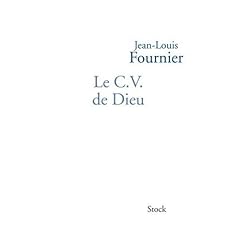 --The blurb--
--The blurb--"Heaven was finished, earth was finished, the animals were finished, and man was finished. God thought that he was done too, and descended into a deep melancholy. He didn't know what to do with himself next. He did a little pottery, kneading a ball of earth, but his heart was no longer in it. He no longer had confidence in himself, he had lost faith. God no longer believed in God. He urgently needed something to do, new projects and big tasks. He therefore decided to seek work, and like everyone else, he has to draft his CV..."
from www.amazon.fr; translation mine
--The review--
We may be on the cusp of Jean-Louis Fournier's work being catapulted further into the public eye. Not to be confused with the more famous Alain-Fournier (author of the acclaimed Le Grand Meaulnes), this M. Fournier is barely known outside of France, with his works at present being only available in French. This could, however, all be about to change, with the esteemed Prix Femina, a literary prize created in 1904, being awarded to his latest offering (Where Are We Going, Dad?) last year. If this work is translated into English, others could soon follow, including the delightful light read God's CV. As well as being quite short, the interview format between God and the director of a company is frequently interrupted by various personality tests filled out by the man himself, as well as (among other things) medical and law papers, and correspondence between God and the Pope.
God is presented much in the way ancient Greek legends portrayed their gods: as an ultimately fallible being not that far away from being human, but having the ability to wield awesome power. This Bruce-Almighty quality is quite likeable and makes the character of God far less irritating than he could have been: as well as displaying modesty and creativity, he also suffers from crises of confidence, leaves things to the last minute, and occasionally even displays streaks of evil that Hitler would be proud of. Some good attempts are made by the author to explain things like why God created disability (variety's the spice of life, innit) and why the good die young, even if these are not always followed through. In the latter scenario, the analogy of a cinema is used: you go in (at the beginning of your life), watch the film (your life plays out) and then you exit the cinema (you die), but this is not entirely successful, as the reason why people die young, or are dragged out of the movie theatre kicking and screaming halfway through the film, is not really addressed or explored properly. However, given the highly fallible God that Fournier has set up for us, chances are this was the intention.
The book is well-written with plenty of humour, and the setup of various documents being used to tell the story is a successful narrative device that other authors, such as Paul Torday, have used since. The length is just about right too, keeping the plot taut and concise. The notions of God, religion, Satan and hell are themes that seem to crop up repeatedly in Fournier's oeuvre, so I would be interested to see his other interpretations of the idea. In God's CV, we are even confronted with the suggestion that God and the devil are one and the same, meaning that this 'light read', then, actually turns out to be considerably dark in places. However, the ending is lighthearted, slightly humorous in a sinister sort of way, and completely appropriate, rounding the book off nicely. In a world of dark times, we need books like this that simultaneously confront and deflect from the world's major concerns through deftly-woven black humour. If the Prix Femina has any clout at all, it is to be hoped that soon all you anglophones will be able to read this too.
Other works by Jean-Louis Fournier
Where Are We Going, Dad?/Où on va, papa? (2008)
Blasted God!/Satané Dieu! (2005)
Little Meaulnes/Le Petit Meaulnes (2003)
I'm Not Going To Hell/J'irai pas en enfer (2001)
The Dark Girl/La Noiraude (1999)
My Dad Never Killed Anyone/Il a jamais tué personne mon papa (1999)
I'll teach you to be polite, little idiot/Je vais t'apprendre la politesse, p'tit con (1998)





No comments:
Post a Comment